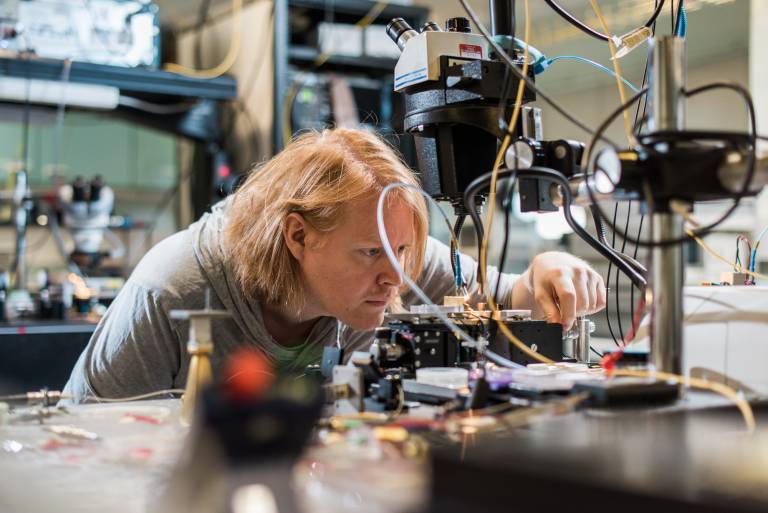UCL receives £54m boost to doctoral training in engineering and physical sciences
12 March 2024
The UCL Faculties of Engineering, Mathematical and Physical Sciences (MAPS) and Life Sciences will lead seven new government-funded Centres for Doctoral Training and be a partner in a further two.

The new Engineering and Physical Sciences Research Council (EPSRC) centres will address key challenges in areas including net zero, AI, defence and security, healthcare and quantum technologies.
The centres, among 65 announced by the Department for Science, Innovation and Technology (DSIT), are a joint investment between government, academia and industry, with £500 million funding from UK Research and Innovation (UKRI) and the Ministry of Defence, plus a further £590 million from universities and business partners. It is the UK’s biggest-ever investment in engineering and physical sciences doctoral skills.
UCL will lead seven CDTs in areas including quantum computing, cybersecurity, digital healthcare and antimicrobial resistance.
UCL President and Provost, Dr Michael Spence, said: “Interdisciplinary collaboration is a big part of UCL’s research strength, which is evident in the exciting Doctoral Training Centres announced today. Each one will leverage UCL’s world-leading expertise in engineering and physical sciences to help tackle key societal challenges, including better tools to diagnose and treat cancer, solutions to counter the threat of antimicrobial resistance, and the quest to make quantum computing a reality.”
The successful UCL CDTs and their leads in MAPS faculty are:
- EPSRC Centre for Doctoral Training in Collaborative Computational Modelling at the Interface
Led by: Professor Timo Betcke (UCL Mathematics and Advanced Research Computing Centre) - EPSRC Centre for Doctoral Training in Quantum Computation and Quantum Communications (QC2)
Led by: Professor Paul Warburton (London Centre for Nanotechnology at UCL) - EPSRC and BBSRC Centre for Doctoral Training in Engineering Solutions for Antimicrobial Resistance
Led by: Professor Lena Ciric (UCL Civil, Environmental and Geomatic Engineering) and Professor Bart Hoogenboom (London Centre for Nanotechnology at UCL)
MAPS faculty will also partner in one further CDT:
- EPSRC CDT in Quantum Informatics
UCL lead: Professor Andrew Green (London Centre for Nanotechnology at UCL)
Dean of the Faculty Professor Ivan Parkin said: “We are delighted by the success in the CDT applications. There are very strong collaborations between engineering and MAPS which have fostered this success. I am particularly pleased to see the successes led by the London Centre for Nanotechnology in quantum technology and anti-microbial resistance.”
Professor Bart Hoogenboom, who initiated the bid for the CDT in Engineering Solutions for Antimicrobial Resistance funding, said: “We are facing a growing microbial resistance against antibiotics, which can cause minor infectious diseases to become deadly. This is a huge and complex problem. We are delighted to now be in a position to train a next generation of brilliant physical scientists and engineers to help finding solutions against this major health threat.”
Professor Timo Betcke, lead for the CDT in Collaborative Computational Modelling at the Interface, said: “We are excited about this funding decision. With the CCMI CDT we are uniquely placed at UCL and Imperial to train graduates in research software engineering and its applications in the computational and data sciences at the highest international level.”
Professor Charlotte Deane, Executive Chair of the Engineering and Physical Sciences Research Council, commented: “Spanning locations across the UK and a wide range of disciplines, the new centres are a vivid illustration of the UK’s depth of expertise and potential, which will help us to tackle large-scale, complex challenges and benefit society and the economy.
"The high calibre of both the new centres and applicants is a testament to the abundance of research excellence across the UK, and EPSRC’s role as part of UKRI is to invest in this excellence to advance knowledge and deliver a sustainable, resilient and prosperous nation.”
Links
- Professor Timo Betcke’s academic profile
- Professor Paul Warburton’s academic profile
- Professor Bart Hoogenboom’s academic profile
- Professor Andrew Green’s academic profile
- UCL Mathematics
- London Centre for Nanotechnology at UCL
Image
- Dr James Seddon, at the time a PhD student in an earlier EPSRC Centre for Doctoral Training led by Professor Alwyn Seeds (UCL Electronic & Electrical Engineering).
Media contact
Dr Matt Midgley
E: m.midgley [at] ucl.ac.uk
 Close
Close

